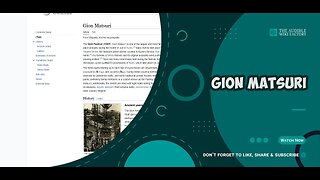Premium Only Content

Friedrich Wilhelm Nietzsche was a German philosopher, prose poet, cultural critic, philologist,
Friedrich Wilhelm Nietzsche was a German philosopher, prose poet, cultural critic, philologist, and composer whose work has exerted a profound influence on contemporary philosophy. He began his career as a classical philologist before turning to philosophy. He became the youngest person ever to hold the Chair of Classical Philology at the University of Basel in 1869 at the age of 24. Nietzsche resigned in 1879 due to health problems that plagued him most of his life; he completed much of his core writing in the following decade. In 1889, at age 44, he suffered a collapse and afterward a complete loss of his mental faculties, with paralysis and probably vascular dementia. He lived his remaining years in the care of his mother until her death in 1897 and then with his sister Elisabeth Förster-Nietzsche. Nietzsche died in 1900, after experiencing pneumonia and multiple strokes.
Nietzsche's writing spans philosophical polemics, poetry, cultural criticism, and fiction while displaying a fondness for aphorism and irony. Prominent elements of his philosophy include his radical critique of truth in favor of perspectivism; a genealogical critique of religion and Christian morality and a related theory of master–slave morality; the aesthetic affirmation of life in response to both the "death of God" and the profound crisis of nihilism; the notion of Apollonian and Dionysian forces; and a characterization of the human subject as the expression of competing wills, collectively understood as the will to power. He also developed influential concepts such as the Übermensch and his doctrine of eternal return. In his later work, he became increasingly preoccupied with the creative powers of the individual to overcome cultural and moral mores in pursuit of new values and aesthetic health. His body of work touched a wide range of topics, including art, philology, history, music, religion, tragedy, culture, and science, and drew inspiration from Greek tragedy as well as figures such as Zoroaster, Arthur Schopenhauer, Ralph Waldo Emerson, Richard Wagner and Johann Wolfgang von Goethe.
After his death, Nietzsche's sister Elisabeth became the curator and editor of his manuscripts. She edited his unpublished writings to fit her German ultranationalist ideology, often contradicting or obfuscating Nietzsche's stated opinions, which were explicitly opposed to antisemitism and nationalism. Through her published editions, Nietzsche's work became associated with fascism and Nazism; 20th-century scholars such as Walter Kaufmann, R. J. Hollingdale, and Georges Bataille defended Nietzsche against this interpretation, and corrected editions of his writings were soon made available. Nietzsche's thought enjoyed renewed popularity in the 1960s and his ideas have since had a profound impact on 20th- and early 21st-century thinkers across philosophy—especially in schools of continental philosophy such as existentialism, postmodernism and post-structuralism—as well as art, literature, poetry, politics, and popular culture.
YOUTH (1844–1868)
Born on 15 October 1844, Nietzsche grew up in the town of Röcken (now part of Lützen), near Leipzig, in the Prussian Province of Saxony. He was named after King Friedrich Wilhelm IV of Prussia, who turned 49 on the day of Nietzsche's birth (Nietzsche later dropped his middle name Wilhelm). Nietzsche's parents, Carl Ludwig Nietzsche (1813 to 1849), a Lutheran pastor and former teacher; and Franziska Nietzsche (née Oehler) (1826 to 1897), married in 1843, the year before their son's birth. They had two other children: a daughter, Elisabeth Förster-Nietzsche, born in 1846; and a second son, Ludwig Joseph, born in 1848. Nietzsche's father died from a brain ailment in 1849; Ludwig Joseph died six months later at age two. The...
LINK TO ARTICLE: http://en.wikipedia.org/wiki/Friedrich_Nietzsche
TAGS: Friedrich Nietzsche, Writers about religion and science, Writers about activism and social change, University of Bonn alumni, University of Basel faculty, Theorists on Western civilization, Stateless people, Social philosophers, Social critics, Prussian Army personnel, Philosophy writers, Philosophers of time, Philosophers of social science, Philosophers of sexuality, Philosophers of religion, Philosophers of psychology, Philosophers of nihilism, Philosophers of mind, Philosophers of literature, Philosophers of history, Philosophers of ethics and morality, Philosophers of education, Philosophers of culture, Philosophers of art, People from the Province of Saxony, People from Lützen, Ontologists, Moral philosophers, Metaphysicians, Metaphilosophers, Leipzig University alumni, Irony theorists, Hellenists, German social commentators, German music critics
#GeneralKnowledge #AudibleWikiFactory #Audible #Wikipedia #FriedrichNietzsche
-
 6:00
6:00
The Audible Wiki Factory
1 year agoThe Gion Festival is one of the largest and most famous festivals in Japan, taking place
397 -
 LIVE
LIVE
Mally_Mouse
1 hour agoLet's Play!! -- Stardew Valley pt. 23!
174 watching -
 16:21
16:21
China Uncensored
5 hours agoCan Anything Stop the Tiktok Ban?
26.4K6 -
 7:08
7:08
Guns & Gadgets 2nd Amendment News
9 hours agoTruckers Fight For National Reciprocity
19.6K7 -
 1:30:22
1:30:22
InfiniteWaters(DivingDeep)
11 hours ago7 MOST USEFUL MANIFESTATION LIFE HACKS EVER!
19.1K1 -
 47:17
47:17
PMG
2 hours ago $0.25 earnedHannah Faulkner and Julie Behling | Beneath Sheep's Clothing
11K -
 38:35
38:35
CharLee Simons Presents Do Not Talk
1 day agoDO NOT TALK with SAM ANTHONY (YourNews.com) Zuckerberg vs. Anthony!
7.61K2 -
 3:46:49
3:46:49
Scammer Payback
5 hours agoCalling Scammers Live
35.9K6 -
 43:49
43:49
Stephen Gardner
5 hours ago🔥Congress DROPS Bad News on Newsom and Biden!
81.7K74 -
 1:54:54
1:54:54
Twins Pod
5 hours agoHe Left The RAP Industry To Make Christian Music! | Twins Pod - Episode 48 - Bryson Gray
62.9K16